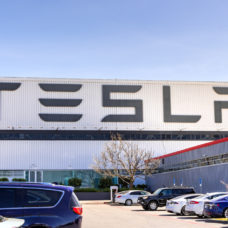Ahead of the BulgariaSat-1 mission, which was delayed, SpaceX is testing a droneship that will better protect the first stage of a Falcon 9 after landing. Meanwhile, Musk has published his “Mars Plan.”
When it comes to his space plans, Elon Musk’s primary goal is clear, he wants to help making humanity a “multi-planetary species”, and make SpaceX the first company to allow humankind to colonize Mars and the solar system.
Elon Musk wants Mars flights to cost $200,000 USD.Click To TweetThe major hurdle to this goal is mainly financial, as rockets fly only once, although it takes up the majority of launch cost. SpaceX aims to bring interplanetary travel ticket to its lowest-imaginable price (some $200,000 USD), and to achieve that, the company intends to build a transport system with reusable rockets, which have already been successfully tested.
Optimus Prime Droneship to Handle Reusable Rocket Landings
When reusable rockets land vertically on an autonomous spaceport drone ship (ASDS), they tend to slide off the flat surface because of the height of the structure, the changed weight of empty fuel tanks, and the consequently altered center of mass.
As a solution to this sliding problem, a new robot has entered SpaceX arsenal and has been spotted on the company’s drone ship “Of Course I Still Love You” (OCISLY) in Port Canaveral, Florida.
Named “Roomba” first, then later changed to the Optimus Prime droneship by Redditors after the Autobot leader from the “Transformers” franchise, the 50 feet wide pad’s role will be to maintain the first stage of the rocket and tie it down to the drone barge, with no need for human intervention.
Then, the recovered boosters will be reprocessed on-site at Port Canaveral, after a five-year lease agreement with port authority. There will be no need to transport boosters back to Texas, which should save a lot of time and money for SpaceX.
Musk’s Plan to get Mars Travel Ticket Down to $200,000
Today, Monday 19, was supposed to be the launch day of BulgariaSat-1 (a Bulgarian communication satellite) aboard a reused Falcon 9 rocket. However, the mission was delayed to no earlier than next Friday, June 23, after the detection of a suspect valve malfunction on the booster’s payload.
Notwithstanding, nothing seems to be able to stop Musk from pursuing his ultimate dream: Mars.
The visionary entrepreneur has published a paper where he outlined his Mars plan, which you can read in full here. Estimating that a thriving human civilization on the Red Planet requires at least 1 million people (within 40-100 years), he plans to land the first colonists as soon as 2024.
To revolutionize access to space, the first key factor is to cut costs and get the Mars travel ticket from a whopping $10 billion USD down to $200,000 USD, which can be achieved with reusable launch vehicles following the model of airplanes.
Musk revealed plans for a giant spacecraft that will be capable of carrying 100 people to Mars, and can be refueled while in orbit. In addition, to be able to return to Earth, the plans include a solution for the spacecraft’s need of propellant.



















Comments (0)
Most Recent